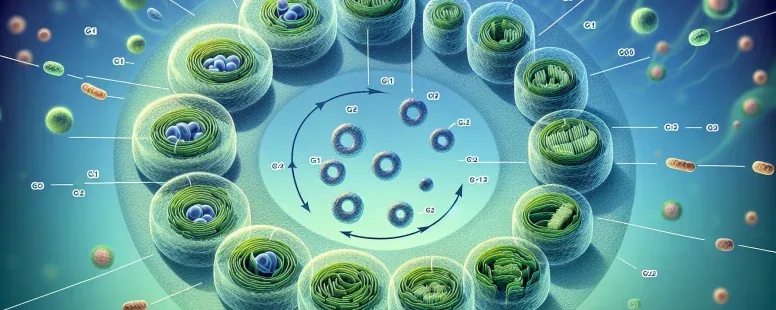True or False: Mitosis Is Another Name for the Cell Cycle? Unraveling the Misconception
Picture the intricate dance of life happening within your body at this very moment. Cells divide, renew, and repair in a process so precise it feels almost magical. But when you hear terms like “mitosis” and “cell cycle,” do they seem interchangeable? It’s easy to assume they’re just two ways of describing the same phenomenon—but are they really?
Understanding how cells function is like unlocking nature’s blueprint for growth and survival. Mitosis plays a starring role, but does it encompass everything in the cell cycle? This question isn’t just about biology; it’s about grasping the fundamental mechanics that keep you alive. Let’s unravel this mystery and see if mitosis truly stands as another name for the cell cycle—or if there’s more to it than meets the eye.
Understanding Mitosis And The Cell Cycle
Mitosis and the cell cycle are interrelated but distinct biological processes. Understanding their roles clarifies how cells grow, replicate, and function in living organisms.
What Is Mitosis?
Mitosis is a type of cell division where a single cell splits into two identical daughter cells. It’s essential for growth, tissue repair, and asexual reproduction in multicellular organisms. During mitosis, the genetic material (DNA) duplicates and divides evenly between the two new cells. This process occurs in five stages: prophase, metaphase, anaphase, telophase, and cytokinesis.
For example, when you scrape your knee, mitosis helps replace damaged skin cells by producing new ones genetically identical to the originals. Errors during mitosis can lead to issues like cancer or genetic mutations because they disrupt normal cellular functions.
What Is The Cell Cycle?
The cell cycle refers to the entire sequence of events that occur as a cell grows and divides. It consists of four primary phases: G1 (cell growth), S (DNA synthesis), G2 (preparation for division), and M (mitosis). These phases ensure that cells duplicate accurately while maintaining proper size and function.
If any stage of the cycle malfunctions—for instance if DNA replication is incomplete during the S phase—the resulting daughter cells may have abnormalities affecting their viability or behavior. Regulatory proteins such as cyclins monitor each phase to prevent errors from propagating through subsequent generations.
Key Differences Between Mitosis And The Cell Cycle
| Aspect | Mitosis | Cell Cycle |
|---|---|---|
| Definition | Division into two identical cells | Full process of growth & division |
| Phases Involved | Only involves M phase | Includes G1, S, G2 & M phases |
| Function | Produces genetically identical cells for repair or reproduction | Regulates overall timing & accuracy of cellular replication |
While mitosis occupies just one part within the broader framework of the cell cycle—itself critical—it doesn’t encompass other necessary steps like DNA synthesis or preparatory growth that precede actual division events.
Analyzing The Statement: True Or False Mitosis Is Another Name For The Cell Cycle
The claim that “mitosis is another name for the cell cycle” often arises from a misunderstanding of biological processes. While mitosis plays a role within the cell cycle, they are not synonymous.
Origins And Misconceptions About The Statement
Confusion between mitosis and the cell cycle stems from their interconnected roles in cellular function. Some may assume they’re identical because both involve cell division. But, this belief overlooks critical distinctions. For example, mitosis refers specifically to nuclear division (e.g., prophase and metaphase), while the cell cycle includes additional phases like G1 and S phase where growth and DNA replication occur.
Educational gaps can amplify these misconceptions. Textbooks or study materials sometimes oversimplify complex processes, leading learners to equate mitosis with the entire sequence of cellular activities.
Scientific Evidence Addressing The Claim
Scientific research clarifies that mitosis represents only one stage within the broader framework of the cell cycle. Regulatory mechanisms, such as cyclin-dependent kinases (CDKs), ensure each phase progresses accurately. For instance, during interphase—a non-mitotic stage—cells prepare for division through DNA synthesis (S phase).
Studies highlight errors when distinguishing these concepts could lead to misinterpretations in areas like cancer biology or genetic engineering. If you examined research on tumorigenesis, you’d find disruptions in non-mitotic stages can be just as critical as problems during mitosis itself.
Summarizing, evidence consistently supports that while mitosis is integral to the cell cycle’s function, it does not represent its entirety nor replace other essential phases like growth and preparation steps preceding actual division.
Importance Of Differentiating Between Mitosis And The Cell Cycle
Understanding the distinction between mitosis and the cell cycle enhances your knowledge of cellular processes. These terms represent different, yet interconnected aspects of cell behavior.
Implications For Biology Education
Clear differentiation between mitosis and the cell cycle improves learning outcomes in biology education. If students conflate these concepts, they may struggle to grasp how cells grow, replicate DNA, or repair tissues. Educators can incorporate detailed diagrams showcasing mitosis as a stage within the broader cell cycle framework to address this issue. For instance, representing G1, S, and G2 phases alongside mitotic stages like metaphase emphasizes their sequential relationships.
Misunderstandings about these processes might hinder advanced study in genetics or molecular biology. By teaching that regulatory proteins manage transitions across all phases—not just during mitosis—you prepare learners for complex topics such as cancer research or developmental biology.
Applications In Research And Medicine
Differentiating these terms plays a critical role in medical advancements and scientific research. When studying diseases like cancer, researchers analyze errors not only during mitosis but also in other cell cycle stages (e.g., DNA replication abnormalities in the S phase). Targeted therapies often aim at correcting disruptions specific to non-mitotic phases.
In regenerative medicine, understanding how stem cells navigate their cycles enables better control over tissue engineering applications. For example, optimizing conditions for controlled progression through G1 can enhance success rates in lab-grown organs.
Accurate terminology supports communication among scientists working on global challenges like genetic disorders or drug development. Mislabeling “mitosis” when referring to “cell cycle” could lead to flawed experimental interpretations or ineffective treatments.
Final Verdict: Is The Statement True Or False?
The statement “mitosis is another name for the cell cycle” is false. Mitosis represents only one phase within the larger framework of the cell cycle, which includes interphase (G1, S, and G2 phases) followed by mitosis (M phase). While mitosis focuses on dividing a parent cell into two identical daughter cells, the cell cycle encompasses all events leading up to and including this division.
Confusion often arises because educational materials simplify these processes or emphasize mitosis as a key event. But, understanding their distinction is critical in fields such as genetics and cancer research. For example, errors during DNA synthesis in the S phase can have consequences just as severe as mistakes during anaphase in mitosis. Regulatory proteins monitor each stage to prevent abnormalities that might otherwise lead to diseases like cancer.
By differentiating between these terms accurately, you avoid misconceptions that could hinder advanced studies or communication within scientific disciplines. Always remember: while interconnected, mitosis and the cell cycle are not synonymous entities but distinct components of cellular biology’s intricate narrative.
Conclusion
Recognizing the distinction between mitosis and the cell cycle enhances your understanding of cellular biology’s complexity. While mitosis plays a vital role in cell division, it’s just one phase within the broader sequence of the cell cycle. Misinterpreting these terms can lead to confusion, especially in advanced studies or medical research.
By grasping how each process functions independently yet interdependently, you gain valuable insights into growth, repair, and disease prevention. Precise knowledge not only strengthens your comprehension but also supports clearer communication in scientific fields where accuracy is crucial.
- Squarespace Versus Wix: A Comprehensive Comparison - November 23, 2025
- Alternatives To Breezy HR - November 23, 2025
- LCD Versus OLED: Choosing the Right Display Technology - November 23, 2025







